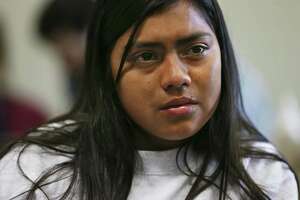LOCAL // GRAY MATTERS
How can teachers help children who have witnessed family separation?

In a few weeks, most children will be headed back to school.
Meanwhile, images of mothers and fathers seeking refuge and being separated from their children upon trying to enter the country along the U.S-México border have been circulating everywhere. They are on the cover of magazines and on the front page of local and national newspapers. Small children sobbing as their parents are handcuffed. Adolescent youth held in detention centers. Mothers and fathers in anguish as they wait for answers after having their children taken away from them.
These images have flooded our social media feeds and continue to be debated on the evening news even as efforts are being made to reunite families.
Not only have we seen these images and heard the stories shared on different platforms, but so have our children. Though we might think that this issue does not impact them, unknowingly, they might indeed be in closer proximity to these issues than we think they are. Within our neighborhoods, churches and other social outlets, children have friends or know of peers who have been directly or indirectly impacted by Trump's "zero tolerance" immigration policy. Some children and youth in our schools are themselves undocumented, or they come from mixed-status families and fear the uncertainty of their futures in this country. Some children who might be very close to us might have experienced severe trauma from such separations and now live in constant fear.
As teacher educators and former classroom teachers, first and foremost, we believe that all teachers as public servants should make their number one priority ensuring that all children feel safe and secure in their classrooms. Creating a safe space takes work, and it starts not by ignoring such pressing issues and pretending that the children don't know and are not affected by them but by opening space for dialogue in the classroom.
Above all, it happens by teachers holding space to listen and hear children and youths' stories, their concerns, their fears and their questions. All our children will have stories and questions of what they have seen, heard, witnessed or experienced firsthand. We cannot and should not ignore their questions.
No matter how uncomfortable their questions might make us feel, we need to respond to them. One entry point into such conversations and into responding to children's concerns is through the use of children's books that directly speak to issues of immigration, family separation and detention.
Children's books can help us begin a conversation to address the root causes of their concerns and the harm that these policies and acts of violence cause within communities. Children's books can help us discuss the problem and all the layers of its complexity and also often offer possible solutions to the issue.
"Two White Rabbits" by Jairo Buitrago is a book about immigration that is appropriate for children of all ages and that is written in clear and accessible language. The story is told from the point of a view of a young girl who is traveling with her father. She is unaware of where they are going. The illustrations, however, provide more detail of their journey and where they are headed — la frontera, or the border. Though she might not notice or understand, her father and the other adults along with them express feelings and actions that provide entry points into conversations with children about immigration. Their words and the book's illustrations open up space for teachers to draw upon their own students' questions, understandings, ideas and experiences about immigration in honest and meaningful ways.
READ MORE: Don't believe the lies about immigrants
As teacher educators and teachers, we need to listen with compassion and without judgment and look for resources to support our children and their families as we work together to learn from one another's stories and experiences.
There might be things that we are uncertain about, or answers that we cannot provide, but we need to be honest about these things with children, too.
Teachers have a moral obligation to open space in the classrooms to discuss the current political moment. The decision to address the issue is deeply rooted in teachers' long held convictions to all children, families and communities as public servants and what we believe to be a human issue of equity and justice.
This is not an issue where there are two sides. There is only one side, the moral side — you don't take children away from their parents.
Tracey T. Flores is an Assistant Professor of Language and Literacy Studies in the Department of Curriculum and Instruction and is affiliated with The Center for Mexican American Studies, and Luis Urrieta is the Susan B. and John L. Adams Professor of Education and is affiliated with The Lozano Long Institute of Latin American Studies, The Center for Mexican American Studies and the Native American and Indigenous Studies Program at the University of Texas at Austin.





No comments:
Post a Comment